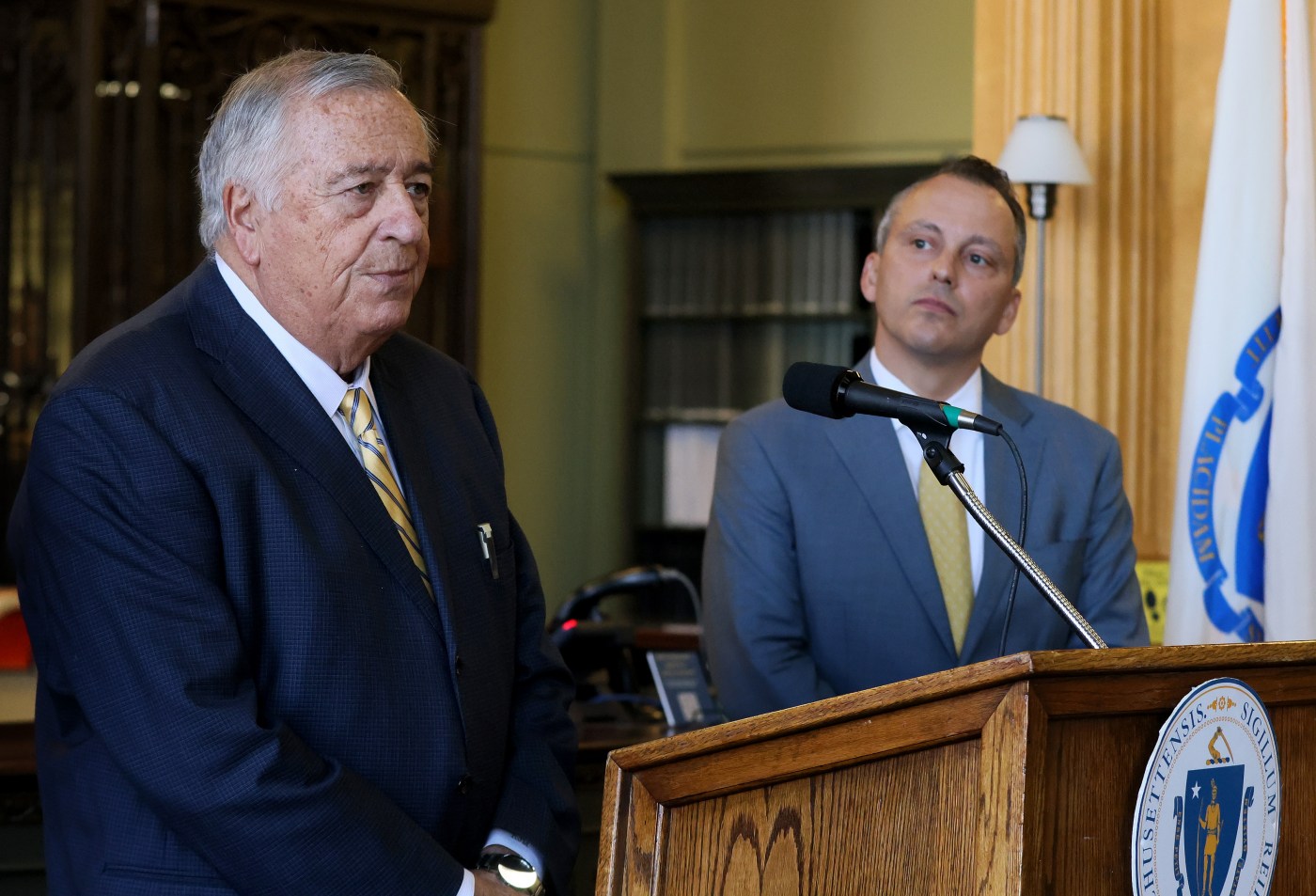
Mass. House passes $58B state budget after rejecting Republican shelter reforms
The Massachusetts House passed a $58 billion fiscal year 2025 budget Friday that includes hundreds of millions for emergency shelters, though still far below what Gov. Maura Healey has said is needed to fund the system.
Representatives tacked on less than $100 million to the bill over three days of deliberations, nearly all of which took place behind closed doors except for a handful of policy debates around tax exemptions and credits, college credits, no-cost prisoner calls, and the state-run shelters.
The budget that now heads over to the Senate for review largely responds to a post-pandemic economic environment where once-abundant federal aid has all but dried up, tax collections are struggling to meet expectations, and the cost of living in Massachusetts is increasing.
House budget writer Aaron Michlewitz said lawmakers added less to the budget during this year’s debate than last year when $129.7 million was incorporated into the fiscal year 2024 spending plan during a multi-day session.
“We just wanted to be cautious, but also wanted to be able to do the local investments as well that we had done in the past as much as we possibly could. And I think we landed on a good number to do both,” the North End Democrat said.
Related Articles
House rejects attempt to move no-cost inmate calls money to local aid during budget debate
House budget debate kicks off with fiscal warnings from Democrats and Republicans
Now is not the time to let up on ‘critical investments,’ Senate Pres. tells Chamber
Pols & Politics: State-run shelter residency requirement rising from the ashes, again
Healey eyeing changes to State Police promotion process
House Speaker Ron Mariano said leadership officials took “extraordinary measures to diminish some of the expectations” representatives may have had about the state of Massachusetts finances after months of below-benchmark tax collections.
“I think all in all, we’ve preached a pretty conservative message and I think that took hold. And I think the members were respectful of our concerns about where we were going to end up,” he said. “I’ve been around long enough to know that all good times are followed by bad times. And this is a cyclical business.”
In passing the budget, House lawmakers put their stamp of approval on a plan to level-fund the shelter system at $325 million and use another $175 million in one-time surplus revenues from the pandemic-era that are tucked away in a separate spending bill.
Spending on state-run shelters is expected to run $915 million in fiscal year 2025, a massive bill for a system that has come to house thousands of local families and migrants who are often fleeing dangerous or unstable conditions in their home countries.
For the third time this legislative session, Republicans unsuccessfully tried to convince Democrats to agree to a residency requirement for shelter residents a day after the full Legislature approved a nine-month time limit on families’ stays in the system.
Rep. Paul Frost, an Auburn Republican, said legislators should approve a three-month residency requirement — he previously floated one-year and six months — as a “mechanism” to disincentive migrants from coming to Massachusetts.
“We need to deal with those who are trying to or coming into and entering the system,” he said from the floor of the House.
But Rep. Alice Peisch, a Wellesley Democrat who has led shelter reform talks in the House, said a residency requirement, regardless of length, will likely run into a court challenge.
“While no one can predict what the outcome of that challenge will be, a court challenge takes time,” she said. “That means that there will be a fair amount of time before this could be resolved. And if even it were to be upheld, which I seriously doubt, the impact of this would not be felt for some time.”
Democrats also shot down another effort from Frost to prioritize the waitlist for emergency shelter placement based on the amount of time someone has been a Massachusetts resident. A separate amendment to prioritize veterans on the waitlist from Minority Leader Brad Jones was also rejected.
Outside of the emergency shelter system, lawmakers included in the budget a Healey-backed rework of the promotional exam for noncommissioned officers, lieutenants, and captains in the Massachusetts State Police, a move that comes as the agency is facing multiple lawsuits over their procedures.
The idea has drawn mixed opinions, with the union representing state police troopers expressing concerns about “unintended consequences” while top brass say it is a way to better measure a candidate’s suitability for promotion.
The Legislature is still far off from sending Healey a final budget. Senators will take what the House passed Friday, rewrite it, and release their own version in early May. The branch is expected to hold their budget debate later in the month.
The two competing proposals will then likely head into a six-member panel of legislators, typically led by each chamber’s budget chief, to hash out differences, a process that can take months.


